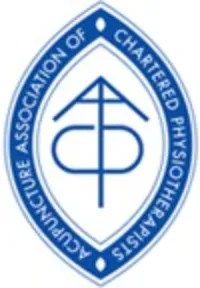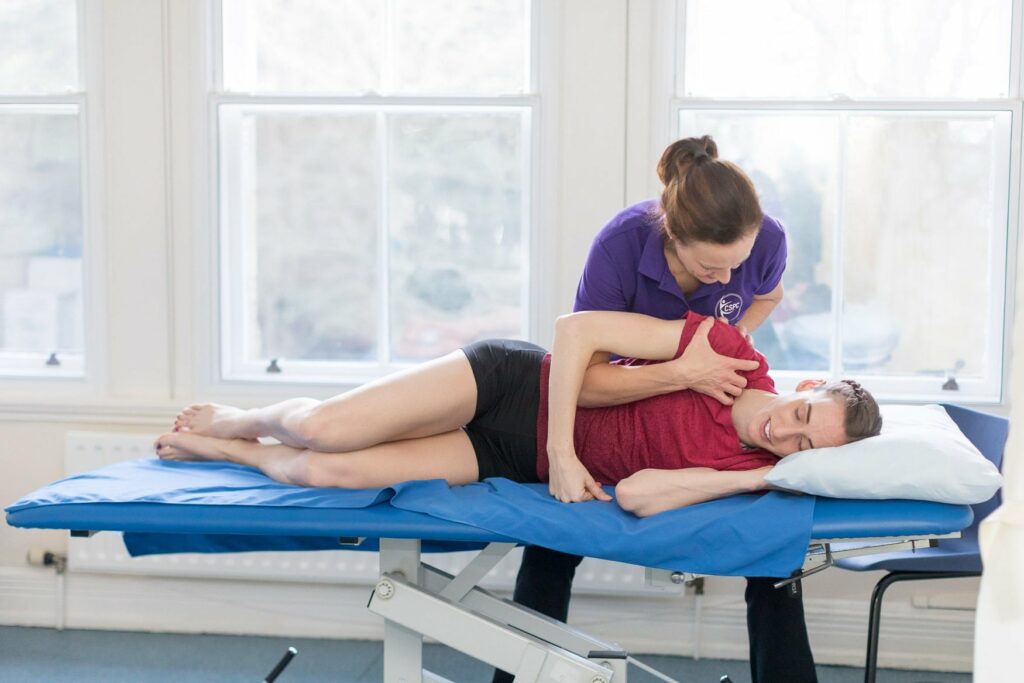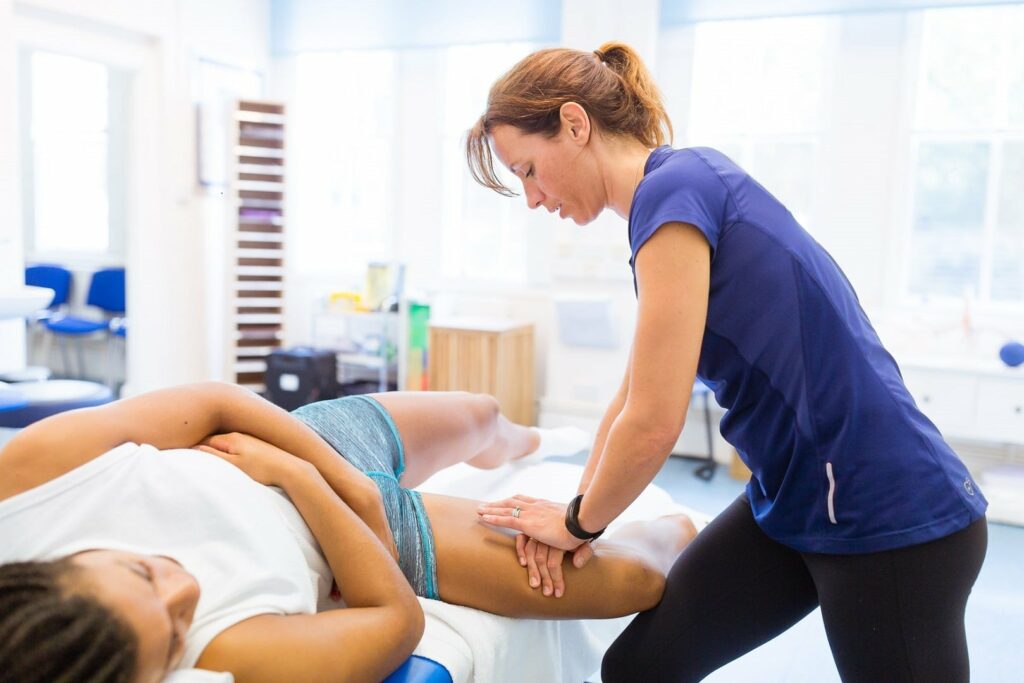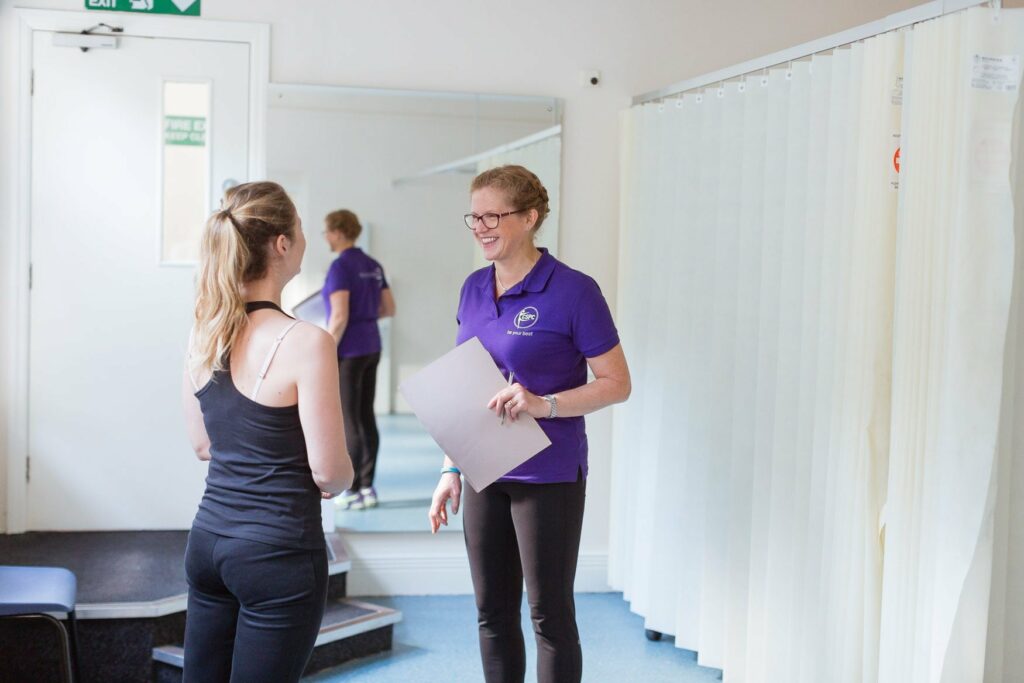What is acupuncture?
Acupuncture is one of the many skills employed within physiotherapy as part of an integrated approach to patient management. Physiotherapists must obtain a minimal Foundation Acupuncture Accreditation to be able to practice and qualified therapists commonly use acupuncture as an adjunct to other treatment.
Acupuncture involves the insertion of very fine, sterile, single use needles into key points on the body to assist the body’s natural healing process, offer pain relief and regain the body’s equilibrium commonly disturbed with injury or illness. Acupuncture treatment should be tailored for each individual’s needs at the time of attending the appointment.
Physiotherapists can also use an adapted form of acupuncture called dry needling, which is also known as trigger point dry needling. This is usually used for treating muscle pain, myofascial trigger points, and connective tissue, and again would be used as an adjunct to the rest of your treatment.

How does acupuncture work?
- Peripheral/Local (wherever you put a needle)
- Spinal (via the nervous system along spinal segments)
- Supraspinal (via the nervous system within the brain and higher centres)

How long does it take?
This will vary depending on the effect your therapist is hoping to achieve. Many people feel the effect immediately but this is not always the case. Needles vary in length from 30-50 mm and tend to be 0.25-0.30 mm diameter. Being so fine they are often pain free when inserted and in situ.
Needles may elicit a dull, heavy, aching sensation but acupuncture should not be an unpleasant feeling. The time the needles are left in varies, again depending on the effect the therapist is hoping to achieve.
Are there any negative effects of acupuncture?
On the whole, no. Acupuncture is useful as it has very few side-effects, if any. It is safe, clean and pain free. Some people can feel very tired post treatment but this is really a positive effect as it suggests it has stimulated the right response. Occasionally people can feel light headed post treatment as acupuncture can have an adverse effect on blood sugars but as long as you have eaten within the four hours preceding treatment you should not have this reaction.
Very infrequently, it can aggravate pain but this is only temporary and again is not a negative. Feeling great is often reported post treatment which can never be a bad thing.
How is acupuncture used at CSPC?
Is acupuncture safe?
Can everyone have acupuncture?
- A phobia of needles
- Uncontrolled epilepsy
- Poorly controlled diabetes
- Circulatory problems
- A clotting disorder
- A blood borne infection (e.g Hepatitis, HIV, AIDS)
- Are undergoing treatment for cancer or have a diagnosis of cancer
- Are pregnant
- Have recently suffered a stroke or a blood clot
Why have acupuncture?
The World Health Organization (WHO) recommends acupuncture as an effective, safe treatment for up to 100 conditions. There are 28 conditions for which acupuncture has been proven through controlled trials to be an effective treatment.
Acupuncture can help with acute and chronic pain associated with injury or illness, problems associated with arthritis, systemic problems involving the respiratory, gastrointestinal, gynaecological and nervous systems and also anxiety and depressive disorders.
The National Institute for Clinical Excellence (NICE) also advocates the use of acupuncture for persistent low back pain and headaches, however there is much more clinical evidence to show that acupuncture is highly effective at treating a vast majority of conditions.
Summary
Acupuncture is an excellent adjunct to physiotherapy. It can be used with acute and chronic injuries, persistent areas of pain, delayed healing, long term illnesses, general feelings of low mood or to improve feelings of general well-being. It can be used as a stand-alone treatment but more commonly and more effectively it complements other physiotherapeutic interventions such as soft tissue mobilisations, joint manipulation, visceral treatment and exercise therapy.
Acupuncture is not for everyone but it is a highly effective, minimally invasive and safe addition to the management of a vast array of problems.
The History of Acupuncture
Traditional Chinese Medicine
Western Medicine
Acupuncture has been used in Western Medicine (WM) since the 19th century and subsequently, much more scientifically based evidence has been produced in it’s support. Research has shown that acupuncture can stimulate the release of the body’s natural opiates, assist the natural healing response within the body and offers a powerful mechanism for modifying pain transmission within the central nervous system (CNS).
The central nervous system is made up of our brain and spinal cord and works with our peripheral nervous system (PNS) to receive input and control output to all parts of our body. The Autonomic Nervous System (ANS) is part of our PNS and controls bodily functions that we don’t have to consciously think about such as heart rate, blood pressure, breathing rate, digestion processes, temperature control and bladder/bowel function to name a few.
We need to have a balance within the ANS to ensure that we are at optimum physical health. The Parasympathetic and Sympathetic Nervous Systems (PSNS and SNS) maintain an equal balance within our organs and musculoskeletal systems but following injury or illness, the ANS often becomes disturbed and homeostasis is compromised. This is the WM explanation of the Yin/Yang TCM theory.
MEET THE TEAM
Constantly challenging ourselves to be the best
See why patients
love CSPC Physiotherapy



